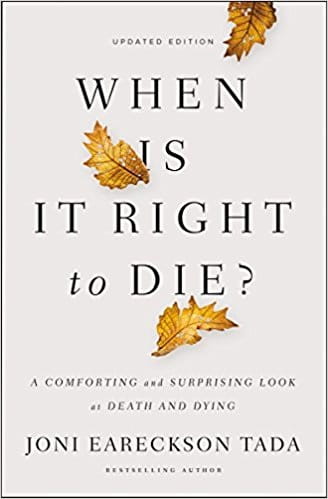What Does the Bible Say about Euthanasia and Assisted Dying?

You may think that euthanasia of people who are dying or disabled is a rather recent phenomenon, but not so. The Old Testament records an incident involving King Saul of Israel, who became seriously wounded on the battlefield. Fearing the advancing enemy, Saul took his own sword and tried to fall on it. He cried out to a soldier, “Come and put me out of my misery... for I am in terrible pain but life lingers on.” The soldier deferred to the wishes of the king and killed him. Then, acting most likely on his supposed innocence, he brought some of Saul’s armor to David and said, “So I killed him, for I knew he couldn’t live.”[i]
There were no laws on the books back then about assisted suicide, but that did not stop David from banging the gavel of Israel’s justice. He ordered the soldier put to death. Perhaps onlookers were shocked by the verdict. After all, Saul was dying anyway. He was in great pain, and if captured, he feared torture and abuse in his final hours. These things were probably on the mind of the soldier who performed the mercy killing, but his actions stand in contrast with the response of Saul’s bodyguard, who, minutes earlier, had been too terrified to commit the act.[ii]
To be fair, it seems that Saul’s status as king of Israel added to the guilt of the deed, and David was outraged that someone had the nerve to harm the king who was anointed by God. But I believe it’s fair to draw a principle that is as true for people today as it was for people several thousand years ago. Whether for a monarch or a common man, carrying out a mercy killing is wrong; the fact that Saul was king only heightened the criminality of the soldier’s deed.[iii]
God clearly opposes active euthanasia, whether it involves plunging a sword into the bleeding body of a king on a battlefield or plunging a syringe full of phenobarbital into the veins of a dying patient. The prohibition against murder in the Ten Commandments logically includes murder of the self.[iv] Mercy killing, whether committed actively or passively, is always presented in a negative light in the Bible. In Scripture, people who either killed themselves or sought to be put out of their misery are always seen as disobedient.[v]
And as for those who will say, “I’ll do with my body as I wish,” God has a response: “You are not your own; you were bought at a price. Therefore honor God with your bodies.”[vi]
No, there’s no biblical account of someone refusing medical treatment to cause death. But what we do have is the example of Jesus and the choices He made in His dying. When Jesus was hanging on His cross, He was offered one drink - which He refused - and a second, which He accepted. Did He change His mind? No, the first drink offered Him was wine mixed with myrrh, a narcotic drink.[vii] The second was a sour wine vinegar, a drink intended to relieve thirst more effectively than plain water.[viii] David Mathis writes, “This first wine represented an offer to ease the pain, to opt for a small shortcut... But this offer Jesus refused... And the second (sour) wine was given to keep him ‘conscious for as long as possible,’ and thus have the effect of prolonging his pain. This is the wine Jesus drank.”[ix]
Similarly, Dr. John MacArthur says of the second offered drink, “On the one hand this would quench a momentary thirst but over the long haul it could... [bring] the kind of refreshment that allowed a person to live a little bit longer.”[x]
A great deal was accomplished in the death of Jesus, and I’m not saying that in His death, Jesus made a definitive statement on end-of-life choices. Yes, Jesus was an example for us, as 1 Peter 2:21 tells us, but His example encompasses far more than our end-of-life choices. What I am saying is that Jesus did not allow the threat of prolonged suffering to influence His decisions. Jesus chose not to sidestep suffering - not to take a shortcut - but instead to meet pain head-on.
In short? The Bible teaches that any means to produce or hasten death in order to alleviate suffering is never justified. Or in the language of the Bible, it is never right to do evil.[xi]
Taken from When Is It Right To Die? by Joni Eareckson Tada. Copyright © 2018 by Joni Eareckson Tada. Used by permission of Zondervan. www.zondervan.com. All rights reserved.
See also: Euthanasia: The Move from Terminal Illness to a Hard Life
[i] 2 Samuel 1:9-10 LB.
[ii] See 1 Chronicles 10:4.
[iii] The real issue in this story is, indeed, not one of mercy killing, but one of harming the person set apart for the Lord’s service. David was angry that the Amalekite chose to “destroy the Lord’s anointed” (2 Samuel 1:14). We should certainly have as much respect for the life of a chosen child of God as the Israelites did for their king.
[iv] Exodus 20:13.
[v] See Judges 9:54-57; 2 Samuel 1:9-16; 1 Kings 16:15-19; Matthew 27:5.
[vi] 1 Corinthians 6:19-20.
[vii] Mark 15:23.
[viii] John 19:29.
[ix] David Mathis, “The Wine Jesus Drank,” Desiring God, May 27, 2010, www.desiringgod.org/articles/the-wine-jesus-drank (a
cessed June 15, 2017).
[x] John MacArthur, “A Closer Look at the Cross,” Grace to You, www.gty.org/library/sermons-library/80-48 (accessed June 15, 2017).
[xi] For example, Romans 12:9, 17, 21; 1 Thessalonians 5:22; 1 Peter 3:9-12. Some evangelicals believe moral principles can be violated when there is a conflict of duties. However, in Scripture, it is never right to disobey a command of God, and it is never sinful to do right. For further study on whether it is ever right to morally disobey God, see Dr. John Frame’s book Medical Ethics: Principles, Persons, and Problems (Phillipsburg, NJ: Presbyterian and Reformed, 1988).
Originally published February 06, 2018.








